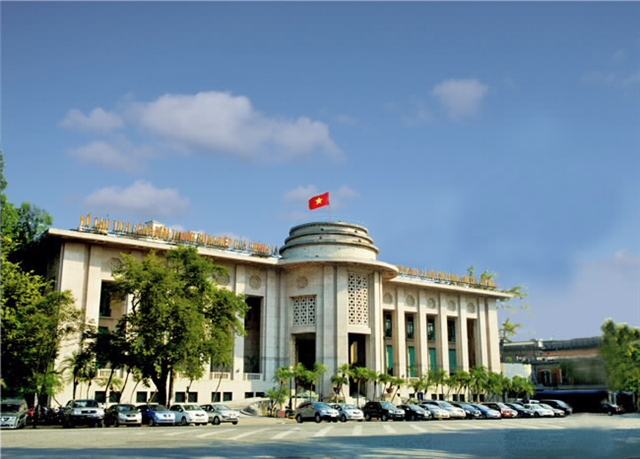 Economy
Economy

 |
| Headquarters of the State Bank of Việt Nam (SBV). Expansionary fiscal and loose monetary policies can be extended for another year when growth is considered a top priority. — Photo sbv.gov.vn |
HÀ NỘI — There is still room for the State Bank of Việt Nam (SBV) to make another policy interest rate cut in 2024 to boost economic growth, analysts believe.
In 2023, the SBV cut its policy interest rates four times.
Under a report released recently, analysts from Saigon Securities Corporation (SSI) said the reason for the rate cut was that the domestic economic activity had not yet returned to its potential growth trend while 2024 had been planned to be a breakthrough year for the Government’s medium-term growth plan in the 2021-25 period.
Therefore, expansionary fiscal and loose monetary policies would be extended for another year when growth is considered a top priority, they noted.
The analysts forecast lending interest rates on existing loans could decrease by another 50-100 basis points in the first half of 2024.
However, it would be difficult for deposit interest rates to continually decrease sharply, they said, forecasting 12-month deposit interest rates by the end of 2024 to be about 5.5 per cent per year.
According to the analysts, the SBV’s monetary policy can continue to focus on specific and priority industries while still controlling credit growth of the banking industry at a reasonable rate of 14-15 per cent to achieve optimal growth, control bad debt and inflation. Well-controlled inflation will create more room for loosening monetary policy.
SSI’s analysts forecast inflation would be at 3.8 per cent in 2024. In 2023, headline inflation fell from around 5 per cent to 3.5 per cent in December 2023 thanks to sharp declines in energy and food prices. Core inflation was also weaker, which showed an easing pressure in demand.
It can be said that the risk of inflation in 2024 is not high, in the context that neighbouring country China is facing deflation, according to the analysts.
However, inflation risks can come from cost-push factors, including potential increases in crude oil and other commodity prices as well as a rise in the Government’s minimum wages. Besides, another important factor to monitor for inflation in 2024 will be the readjustment of weights of commodities that are used to calculate the country’s consumer price index due to be implemented in July or August this year.
Overnight rate
Data from the SBV showed overnight interest rate in the interbank market on Wednesday surged to more than 4 per cent, the highest level in the past nine months.
The rate on the day increased to 4.14 per cent from 2.15 per cent at the end of last week. It meant after just three trading sessions, the rate nearly doubled and reached its highest level since the end of May 2023. It was much higher than the peak level of 2.38 per cent recorded during the peak payment period near the Lunar New Year.
With the surge, the rate for overnight term is currently even higher than that of one-week to three-month terms.
In the interbank market, overnight term accounts for up to 90 per cent of total transaction value.
Along with the overnight term, interest rates at two other key terms also increased sharply compared to the end of last week, of which one-week term was up from 1.27 per cent to 3.81 per cent; two-week term was up from 1.39 per cent to 3.02 per cent; and one-month term was up from 1.85 per cent to 2.55 per cent.
According to experts, the sharp surge of the overnight rate, along with high transaction turnover, means liquidity of the banking system is showing signs of shortage, but it is only in the short term and it will likely cool down soon in the coming trading sessions.
Interbank interest rates have increased significantly after credit growth unexpectedly accelerated in the last month of 2023. In December 2023 alone, credit of the banking system surged by up to 4.35 per cent compared to the previous month, bringing credit of the whole year to 13.5 per cent.
Experts expect the sharp increase in overnight interbank interest rates will contribute to reducing pressure on domestic exchange rates when the US dollar has strongly recovered in the international market. The greenback price is currently listed at VNĐ24,390 per dollar for buying and VNĐ24,790 per dollar for selling, an increase of VNĐ190 compared to before the Lunar New Year holiday.
In a newly released report, analysts from the Vietcombank Securities Company (VCBS) forecast the Vietnamese đồng might still devalue against the dollar when interest rates continue to break deep into the bottom zone.
The development of the exchange rate would depend largely on foreign currency supply from direct and indirect investment cash flows, and remittances, VCBS analysts noted. — VNS




